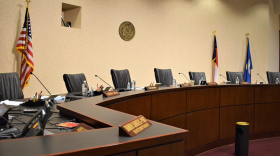The North Carolina State Board of Education approved a policy on Thursday that sets procedures for how parents can seek a remedy if they believe their school has violated the so-called “Parents’ Bill of Rights.”
The recently passed law requires administrators to notify parents if their child indicates they want to change the name or pronouns used for them by school personnel or in school records. The law also bars teaching about gender identity, sexual activity or sexuality in kindergarten through fourth grade, and it requires school boards to establish a means for parents to object to textbooks and supplemental materials.
The law requires the state board of education to hear appeals from parents who believe their school district or charter school is not complying with the law — and for the school to foot the bill.
The state board of education passed an emergency rule Thursday that says the public school unit in question will be billed for the cost of legal services at a rate of $200 per hour. A spokesperson from the Department of Public Instruction confirmed that schools will have to pay the fee regardless of whether the hearing is ruled in favor of the parents or the school.
“While school administrators and educators figure out how to comply with this terrible law, their school districts are also unfairly saddled by the state with an unfunded mandate to cover the cost of appeals regardless of their merit,” North Carolina Association of Educators’ president Tamika Walker Kelly said in a statement.
What happens if a parent believes their rights are violated?
Under the law, school boards must adopt procedures for parents to raise their concerns if they believe their rights under the “Parents’ Bill of Rights” are not being met. If a concern has not been resolved within 30 days after the date the parent notifies the school board, the parent can request a “parental concern hearing” by the state board of education.
To comply with the law, the state board of education passed a policy and an emergency rule to define the process for a parental concern hearing. The board approved both on its consent agenda Thursday with little comment.
The policy allows appeals for certain violations —including failure to notify parents of changes to a student’s name, pronouns, or health services, but not including book challenges.
The appeal will be adjudicated by a “hearing officer” who is in good standing with the North Carolina State Bar. According to staff at the Department of Public Instruction, hearing officers will be independent contractors appointed by the State Board of Education and paid for by the local school district or charter school.
The state board of education’s emergency rule requires schools to pay for a hearing officer to adjudicate appeals from parents and recommend a resolution. The state board of education will then approve, reject or amend a hearing officer’s recommendation at its next regularly scheduled meeting. The law also states a parent can take legal action against a school to seek injunctive relief in court.
The law goes into effect in January.







